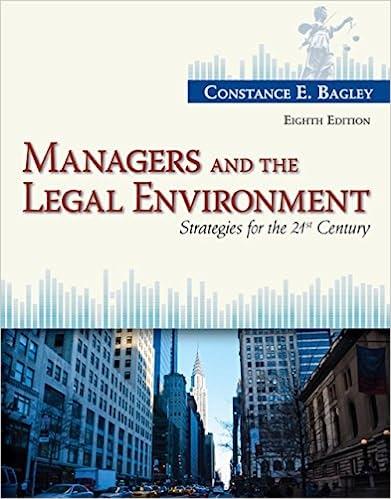Pom Wonderful LLC produces, markets, and sells a bottled blend of pomegranate and blueberry juice. In 2007,
Question:
Pom Wonderful LLC produces, markets, and sells a bottled blend of pomegranate and blueberry juice. In 2007, Coca-Cola introduced, through its Minute Maid brand, "Pomegranate Blueberry," a juice blend that contains 99.4% apple and grape juices, and only 0.3% pomegranate juice, 0.2% blueberry juice, and 0.1% raspberry juice. Pom sued Coca-Cola in 2008, alleging that the name and label misled consumers about the amount of pomegranate and blueberry juice in the product, thus violating the false-advertising provision of the Lanham Act (15 U.S.C. § 1125(a)). The U.S.
Court of Appeals for the Ninth Circuit held that Pom's suit was barred because it "impermissibly challeng[ed]" Food and Drug Administration (FDA) regulations promulgated under the Food, Drug, and Cosmetic Act (FDCA), which permitted use of the Pomegranate Blueberry name and label.
In its petition to the U.S. Supreme Court, Pom argued that courts should "reconcile" the potentially overlapping statutes and that, here, the two statutes were "not in irreconcilable conflict," meaning both could be given full effect. According to Pom, the FDCA sets a "floor for regulation upon which other laws can build, not a ceiling." Pom also pointed out the following: First, the Third, Eighth, and Tenth Circuits have held that Lanham Act claims are actionable despite FDA regulation of labeling or advertising. Second, if the Ninth Circuit's approach was upheld, it would result in regulation of food and beverage labels "almost entirely" by the FDA. According to the General Accountability Office this would result in "significant gaps" because the agency is understaffed and underfunded. Indeed, the FDA itself has acknowledged that it does not generally address misleading food labeling. Third, evidence showed that Pomegranate Blueberry did in fact mislead consumers into believing the primary ingredients were pomegranate and blueberry juice. Fourth, internal Coca-Cola documents indicated that there was a "risk from a misleading standpoint as the product has less than 0.5% of pomegranate and blueberry juices." The U.S. Supreme Court granted certiorari to determine whether the Ninth Circuit had erred in holding that a private party cannot bring a Lanham Act claim challenging a product label that is regulated under the FDCA. How should the Supreme Court rule? Even if permitted under the FDA rules, do you think it was ethical for Coca-Cola to name a product Pomegranate Blueberry juice when those juices comprise less than 0.5% of the product? Should it matter whether the marketing managers at Coca-Cola were aware of the potential to mislead consumers?
Step by Step Answer:

Managers And The Legal Environment Strategies For The 21st Century
ISBN: 9781285860374
8th Edition
Authors: Constance E. Bagley





